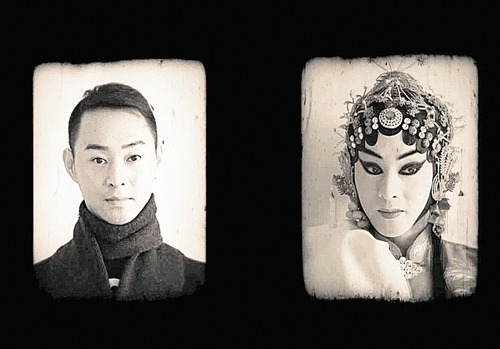
Two photos from Varvara Shavrova's The Opera exhibition display a Peking Opera actor's appearance before and after putting on makeup and costumes.Photos Provided to China Daily
The first Peking Opera actor Shavrova met was Liu Zheng. He introduced Shavrova to others.
"I became friends with these people," Shavrova says.
"We went out to dinner together and socialized."
She came to realize the financial difficulties they face as the genre's popularity declines.
"They're doing lots of work for very little money," she says.
"They have the fan groups and followers on blogs, but a lot fewer compared to big pop stars. But they don't do it for the money. They're doing something entirely beautiful and they love what they do."
She once asked Liu to dress her up as the female role in The Drunken Concubine, which tells a story of the famous Yang Yuhuan, a concubine to Emperor Minghuang in Tang Dynasty (AD 618-907). Liu's mother helped Shavrova dress up. It took two hours.
When it was done, Shavrova stood up and felt dizzy.
"Literally, I couldn't move. And these actors, on top of all this, they have to sing and dance, and they have to do a sword dance. It's really tough," she says.
But while contemporary performances have stolen the stage from Peking Opera, Shavrova believes the genre is modern, rather than archaic.
"I thought of it as being modern on an intuitive level," she says.
"It is like contemporary art, which you wouldn't understand unless you put time into understanding what the artist means. It was very charming and very beautiful."
She also believes it operates according to its own rules.
"It has nothing to do with this life," she says.
Shavrova worries this performance art will die out if its popularity further declines and if the Chinese government doesn't sufficiently support it.
She points out a lot of the country's architectural heritage, such as Beijing's hutong, have largely vanished. If such performances as Peking Opera disappear, too, Chinese culture might be reduced to food and festivals.
Shavrova believes the solution may be to promote among youth, such as in schools.
"They have to understand that the actors are young and dynamic people, and not just some sort of old-fashioned boring people who have learned the lines by heart and are meaningless," she says.
Shavrova was born and educated in Moscow. She moved to London in 1989 and shared her studio time between London and Ireland for the next 15 years, before moving to China in 2005.
At the time, Shavrova's Irish engineer husband was working on a few architecture projects in China, so the couple relocated to China with their two children. Shavrova immersed herself in local life and the art community.
"I was really inspired by 798, the art district in Beijing. I was offered a studio, and I met some Chinese and international artists. And I felt it was a really dynamic place where I can make new projects," she says.
One of her exhibitions in China is Untouched, which compares Beijing with rural Ireland, showing old houses, walls, windows and the people in black-and-white images. Another is Borders, which shows the Russian-Chinese border. The show was inspired by her journey into China.
Shavrova examines everyday Beijing life in Windows on the Hutong, which shows different activities that reflect the ordinary lives of inhabitants through windows. In this exhibition, she also recorded sounds of people chatting away in the rooms to be played alongside the installation.
Her fascination with hutong is seen through the minute details in her photographs, such as window frames, writings on windows, curtains and fish tanks that display fish sold in restaurants. Shavrova did extensive research and interviewed local people. She also made a film about them.
London-based art dealer, curator and gallery owner James Birch says The Opera is "absolutely great".
"I like the idea of the before-and-after situation," he says.
Birch has only seen Peking Opera images in books but never in an art exhibition.
Birch says the show will also generate more international awareness about Chinese culture.
"Many people don't know about Peking Opera, so it's good to make people aware," he says.
Betty Yao, director of the London-based exhibition management firm Credential International Arts Management, also believes The Opera bridges China and the West.
"As overseas Chinese, we all feel proud of what Peking Opera represents," she says.
"But we have little opportunity to know more about it. We always think this is an art form for old people. What is fascinating for me is to see an artist representing a very modern contemporary angle to look at something that is a loved art form—it's her ability to create that bridge and bring in traditional art forms through creativity and reach the younger people of today."
We recommend:
